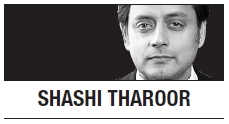NEW DELHI ― The sea of humanity besieging the Shahbag area in the Bangladeshi capital, Dhaka, for the last two months, has had an unusual demand ― unusual, at least, for the Indian subcontinent. The demonstrators have been clamoring for justice for the victims of the genocidal massacres of 1971 that led to the former East Pakistan’s secession from Pakistan.

The demonstrations have been spontaneous, disorganized, and chaotic, but also impassioned and remarkably peaceful. Many of the several thousand demonstrators at Shahbag are too young to have had personal experience of the killings that marked the Pakistani Army’s brutal, and ultimately unsuccessful, attempt to suppress the fledgling independence movement. But they are animated by an ideal ― the profound conviction that complicity in mass murder should not go unpunished, and that justice is essential for Bangladeshi society’s four-decade-old wounds to heal fully.
What is curious about this development is that the subcontinent has preferred to forget the monstrous injustices that have scarred its recent history. A million people lost their lives in the savagery of the subcontinent’s partition into India and Pakistan, and 13 million more were displaced, most forcibly. But not one person was ever charged with a crime, much less tried and punished.
An estimated million more were massacred in Bangladesh in 1971, and only this year have some of the perpetrators’ local allies been tried. Almost every year, somewhere on the subcontinent, riots, often politically instigated, claim dozens ― sometimes hundreds and occasionally thousands ― of lives in the name of religion, sect, or ethnicity. Again, investigations are conducted and reports are written, but no one is ever brought before the bar of justice.
To paraphrase Stalin: The intentional killing of one person is murder, but that of a hundred, a thousand, or a million is merely a grim statistic.
The idealism of Bangladesh’s young demonstrators, however, points to a new development. The outpouring of emotion evident at Shahbag was provoked by a decision of an international criminal tribunal convened by the government. The tribunal, which tries cases of war crimes and crimes against humanity, found a prominent member of Bangladesh’s largest Islamist political party, Jamaat-e-Islami, guilty of complicity in the killings of 300 people, but gave him a relatively light sentence of 15 years in prison (prosecutors had sought the death penalty).
By demanding severe punishment for those guilty of war crimes ― not the Pakistani Army, long gone, but their local collaborators in groups like Jamaat-e-Islami, Al Badar, Al Shams, and the Razakar irregulars ― the protesters are also implicitly describing the society in which they wish to live: secular, pluralist, and democratic.
These words are enshrined in Bangladesh’s constitution, which simultaneously declares the republic to be an Islamic state. While some see no contradiction, the fact that many of the collaborators who killed secular and pro-democracy Bengalis in 1971 claimed to be doing so in the name of Islam points to an evident tension.
If any proof of this clash of values were needed, it came in the form of a hugely impressive counter-demonstration against the Shahbag movement led by activists of the fundamentalist Islamic movement Hifazat-e-Islam, which occupied the capital’s Motijheel area. Unlike the Shahbag events, the counter-demonstration was well-planned and organized, and conveyed the stark message that there was an alternative point of view in this overwhelmingly Muslim country.
The male, bearded, skull-cap-wearing protesters shouted in unison their agreement with speakers who denounced the International Crimes Tribunal. Their supporters include activists of the Harkat-ul-Jihad-Al-Islami-Bangladesh, which has fought alongside the Taliban and al-Qaida in Afghanistan.
The debate between religious fundamentalism and secular democracy is not a new one on the subcontinent. But the issue of justice for the crimes of 1971 has brought the divide into sharp relief. The Shahbag protesters reject Islamic extremists’ influence in Bangladesh, and even call for organizations like Jamaat-e-Islami to be banned, while Hifazat-e-Islam and its supporters want the country’s liberal forces repressed, secularist bloggers arrested, and strict Islamism imposed on Bangladeshi society.
The young people at Shahbag are mainly urban, educated, and middle class; Hifazat derives its support mainly from the rural poor. Traditional versus modern, urban versus rural, intellectuals versus the peasantry: these divisions are the stuff of political clich. But, all too often, clichs become established because they are true.
The Bangladeshi government’s sympathies are closer to the Shahbag protesters than to the Hifazat counter-demonstrators. But it must navigate a difficult path, because both points of view have significant public support. The authorities have even taken steps to appease the Islamists by arresting four bloggers for their posts. But the government remains resolute in its support for the international tribunal.
The irony is that true religion is never incompatible with justice. But when justice is sought for the crimes of those who claim to be acting in the name of religion, the terms of the debate change. The issue then becomes one that has been avoided in Bangladesh for too long: whether claiming to act according to the requirements of piety provides an exemption for murder. The outcome of the standoff in Dhaka should provide an answer in Bangladesh, and its implications could reverberate far and wide.
By Shashi Tharoor
Shashi Tharoor is India’s minister of state for human resource development. His most recent book is “Pax Indica: India and the World of the 21st Century.” ― Ed.
(Project Syndicate)








